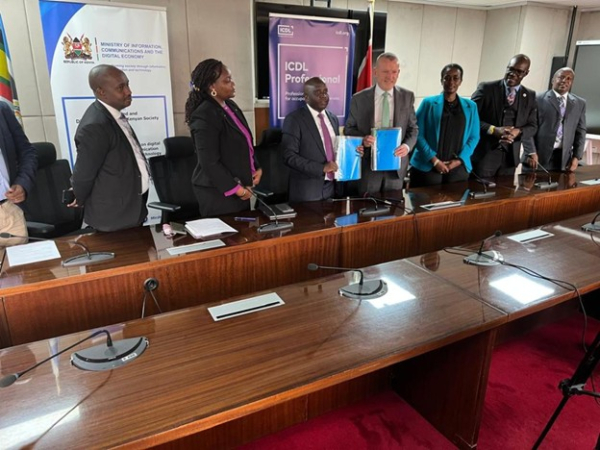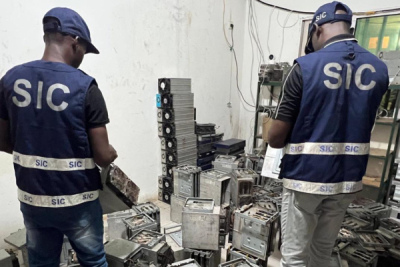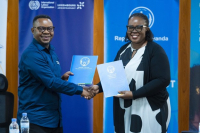
Tech (1115)
-
Africa’s digital content market hits $5.1B, may reach $30B by 2032
-
Growth fueled by youth, internet access, and social media use
-
Monetization uneven; most creators earn under $62 monthly
Africa's digital content creation market is valued at $5.10 billion in 2025 and could reach nearly $30 billion by 2032, according to projections from the analytics firm Coherent Market Insights. With an estimated annual growth rate of 28.9%, the continent is positioning itself as one of the most dynamic hubs in the global creator economy.
This growth is driven by several key factors, starting with Africa's youth population. Nearly 60% of residents are under the age of 25, a generation that is highly connected and consumes digital content. The increasing access to the internet and the high penetration of smartphones have also paved the way for an explosion in content production. Social networks from Facebook to Instagram and YouTube act as catalysts for this economy, joined by local platforms like Boomplay and Mdundo, which enhance opportunities for distribution and monetization.
According to the study, the continent now accounts for 17% of the world's internet users and has approximately 385 million active social media users, a penetration rate of 27.7%. This momentum is fueling a rapid diversification of business models, including online videos, music, tutorials, podcasts, and influencer campaigns, as well as entrepreneurial ventures such as digital agencies, production studios, and digital training academies. Some creators are managing to generate several thousand dollars a month from YouTube alone, confirming the potential of this economy.
However, significant challenges remain. Monetization is highly uneven, with more than half of African creators earning less than $62 per month—a figure far below their potential. Low advertising rates on the continent limit financial returns, while the gradual saturation of platforms, regulatory uncertainties, and a lack of structured support mechanisms are hindering the emergence of viable ecosystems.
To transform this momentum into a genuine economic driver, Africa will need to strengthen digital infrastructure, encourage partnerships between platforms and local players, and, most importantly, create environments that are conducive to innovation and equitable monetization. This also requires better regulation, including copyright protection, adapted tax policies, and transparent compensation models.
Samira Njoya
The MoU establishes a strong framework for collaboration in equipping Kenyans with internationally recognized digital skills certification, ensuring the country is well-positioned to harness digital opportunities and accelerate its path toward a knowledge-driven economy.
Kenya has signed a Memorandum of Understanding (MoU) with the International Certification of Digital Literacy (ICDL) Africa, a digital literacy provider that offers certification programs that verify an individual’s proficiency in essential computer skills. The agreement, announced on August 26, was finalized at a ceremony held by the Ministry of ICT and Digital Economy (MICDE). It aims to advance digital skills development across the country.
Speaking at the ceremony, the Principal Secretary of MICDE underscored the government’s commitment to investing in digital infrastructure and the digitization of public services. He emphasized that building a digitally skilled population—particularly among the youth—will be critical for unlocking opportunities in the growing Business Process Outsourcing (BPO) sector, as well as emerging fields such as software development and Artificial Intelligence.
“ICDL certification will play a vital role in developing the talent pool Kenya needs to compete and thrive in the digital economy,” the PS noted, adding that the Cabinet Minister has given full backing to the partnership.
ICDL CEO Damien reaffirmed the organization’s dedication to supporting Kenya’s digital transformation journey: “A digital economy can only be achieved through digitally skilled people, and ICDL has been building those skills globally for many years.”
The MoU aligns closely with Kenya’s Digital Masterplan 2022–2032, which seeks to digitize 80% of government services over the next decade. While investments in infrastructure and platforms are critical, their impact depends on citizens and civil servants having the right skills to adopt and use them effectively. By introducing internationally recognized ICDL certification, the partnership ensures that Kenyans—particularly youth—are equipped with practical digital competencies in areas such as productivity tools, cybersecurity, and online collaboration.
This comes as Kenya intensifies efforts to position itself as a regional hub for digital and AI-driven governance. Just last week, the government launched an ambitious plan to equip 100,000 public servants with AI and digital competencies through the Regional Centre of Competence (RCOC) based at the Kenya School of Government for Digital and AI Skilling.
These efforts underline Kenya’s commitment to building a future-ready workforce and accelerating its digital transformation agenda.
Hikmatu Bilali
The new platform from PayLogic enables interoperability between banks and mobile money wallets, a critical step for financial inclusion in a nation where cash is king.
Global payment solutions provider PayLogic announced on Monday the launch of the National Payment Switch, a new national payment system in the Comoros. The operational platform aims to reduce the country's reliance on cash and accelerate financial inclusion.
"The successful go-live of the National Payment Switch in Comoros reflects PayLogic’s commitment to advancing secure and interoperable payment infrastructure across emerging markets," said Mohamed Mekouar, PayLogic's executive chairman. "By partnering with central banks and financial institutions, we help deliver systems that drive inclusion, efficiency, and long-term financial innovation."
The platform provides interoperability between banks, microfinance institutions, and mobile money operators, enabling real-time digital transactions such as transfers, merchant payments, and remittances from the diaspora. The goal is to reduce dependency on cash and make financial services more accessible for both households and small businesses.
This initiative is part of the Financial Sector Development Support Project in the Comoros, which is backed by the World Bank. It comes as financial inclusion remains limited in the archipelago. To address this, the Central Bank has launched a policy of free bank account openings for individuals and fee-free money transfers for the diaspora. The objective is to raise the banking rate to 50% by the end of 2025.
However, several challenges could hinder the system's success. Internet penetration remains low at 35.7% as of early 2025, despite relatively high mobile coverage at 77.6%. Public distrust of digital payments could also slow adoption. The project's success will ultimately depend on financial institutions' ability to offer services that are accessible, affordable, and tailored to local needs.
With this launch, the Comoros joins a growing list of countries that have selected PayLogic as a partner for their national interoperable payment switches, including Lesotho, Eswatini, and six central African states through a regional switch.
Samira Njoya
-
AfDB, Japan’s Aerosense partner on drone-based infrastructure management
-
Drones to support road maintenance, disaster response, agriculture, health
-
Initiative tackles Africa’s infrastructure deficit, boosts trade and resilience
The African Development Bank (AfDB) and Japanese drone company Aerosense Inc. signed a letter of intent on Thursday, Aug. 21, to promote the use of drone technology in managing Africa’s infrastructure. The agreement was concluded on the sidelines of the ninth Tokyo International Conference on African Development (TICAD9) in Yokohama, Japan.
"The program is a bold response to Africa’s growing infrastructure challenges. By partnering with Aerosense, we will not only promote efficient road management but also consider promoting other unique solutions such as disaster management, river/flooding control, agricultural sensing, and medical equipment delivery," said Solomon Quaynor, AfDB's Vice President for Private Sector, Infrastructure and Industrialization.
Under the agreement, the AfDB will coordinate relations with African governments, facilitate project financing and build local capacity. For its part, Aerosense will conduct feasibility studies and adapt its drones to local geographical and logistical conditions. The company's technology was selected in June 2025 as part of the Sustainable Road Maintenance Program for Africa (SRMPA), where it will be used to collect precise data on road conditions to facilitate more efficient and less costly predictive maintenance.
The initiative comes amid a chronic infrastructure deficit on the continent. According to the Africa Finance Corporation’s "State of Africa’s Infrastructure 2024" report, the majority of paved roads are concentrated in the continent's northern and southern regions, with nearly 40% of the total in South Africa and Algeria. Every year, Africa loses up to 2% of economic growth due to the poor quality of its infrastructure. Climate change further accentuates this vulnerability, as seen in 2022 when floods in Nigeria destroyed more than 100,000 hectares of farmland and damaged several strategic road arteries.
The use of drones in African public services has already proven effective. In Rwanda, Zipline has delivered more than 500,000 bags of blood to remote areas, while in Ghana and South Africa, drones are used for vaccine distribution and agricultural surveillance. The AfDB-Aerosense agreement aims to expand these applications, particularly for road maintenance, a strategic sector for intra-African trade often slowed by logistics bottlenecks.
Ultimately, the widespread deployment of drones could transform infrastructure management and climate risk prevention on the continent. Regular aerial surveillance would not only reduce maintenance costs but also build resilience in the face of disasters, while promoting economic development and the fluidity of regional trade.
Samira Njoya
-
Interpol operation recovered $97.4M, found 88,000 victims
-
1,209 arrests, 11,432 cybercrime networks dismantled across Africa
-
Major scams uncovered in Angola, Zambia, and Ivory Coast
Interpol announced on Friday, August 22, that a massive anti-cybercrime operation across 18 African countries led to the recovery of $97.4 million and the identification of nearly 88,000 victims.
Codenamed "Serengeti 2.0," the operation, which ran from June to August 2025, also resulted in the dismantling of 11,432 criminal infrastructures and 1,209 arrests.
"Each INTERPOL-coordinated operation builds on the last, deepening cooperation, increasing information sharing and developing investigative skills across member countries. With more contributions and shared expertise, the results keep growing in scale and impact. This global network is stronger than ever, delivering real outcomes and safeguarding victims," said Valdecy Urquiza, the organization’s Secretary General.
Major Scams Exposed
In Angola, authorities discovered 25 illegal cryptocurrency mining farms, operated by 60 Chinese nationals and powered by 45 clandestine mini-power plants. The operation caused an estimated $37 million in damages. The seized equipment will be repurposed to improve electricity access in vulnerable areas.
In Zambia, investigators uncovered a massive online investment scam that affected nearly 65,000 victims and generated an estimated $300 million in losses. Fifteen suspects were arrested, and digital evidence was seized. Investigations are ongoing to trace financial flows and dismantle any international ramifications of the network.
In Ivory Coast, a transnational inheritance scam operating from Germany was neutralized. The main suspect was arrested, and valuables including jewelry, vehicles, and cash worth an estimated $1.6 million were seized.
Regional Cooperation and International Support
Supported by the United Kingdom as part of the African Joint Operations against Cybercrime (AFJOC), the initiative involved private sector experts in cryptocurrency tracing, ransomware analysis, and open-source intelligence. Interpol also collaborated with the International Cyber Offender Prevention Network (InterCOP), a consortium of 36 countries tasked with anticipating and neutralizing digital threats before they materialize.
The operation comes just a few months after "Operation Red Card," which led to the arrest of 306 people and the seizure of nearly 2,000 electronic devices in seven African countries: South Africa, Ivory Coast, Ghana, Kenya, Nigeria, Tanzania, and Uganda.
Cybercrime is a critical issue for African economies, which are already weakened by unevenly developed digital infrastructures. According to the African Union, it costs the continent nearly $4 billion each year. A Cybersecurity Ventures study estimates that the rise of artificial intelligence will further exacerbate the situation, with global losses expected to increase by 11% to $10.5 billion in 2025.
Samira Njoya
• Guinea launches platform for public access to draft constitution
• Citizens can ask legal experts questions via the site
• Platform supports local languages to boost participation rates
In a push to engage citizens ahead of a constitutional referendum scheduled for September 21, Guinea has launched a new digital platform, "maconstitution.info". The online tool gives the public easy access to the full draft of the new constitution, allowing them to understand its key issues and submit questions directly to legal experts. This initiative is a key part of the country's strategy to broaden citizen participation despite limited internet penetration in many rural areas.
The project, a joint effort by the Government's Secretariat General, the Ministry of Posts, Telecommunications, and Digital Economy, and the Ministry of Higher Education, Scientific Research, and Innovation, is part of a broader digital inclusion strategy.
"We are crossing a threshold: marrying technology with democratic values to give every Guinean clear and direct access to the draft of the new constitution. This platform stems from our commitment to comply with Article 18 of Law L/012 of April 25, 2025. It provides everyone with a simple and transparent tool," said Tamba Benoît Kamano, Minister Secretary General of the Government.
The platform offers full access to the constitutional draft and an interactive space for users to ask questions. These questions are handled by legal experts from the Secretariat General, with a commitment to respond within 48 hours.
To ensure the widest possible participation, the platform's content is available in several national languages, which helps reach citizens who do not speak French and reduces linguistic barriers to accessing information. If successful, this approach could become a model for other public consultation processes in Guinea or inspire similar initiatives in the sub-region.
According to DataReportal, Guinea had about 3.96 million internet users at the beginning of 2025, a penetration rate of 26.5%. While this figure is growing, it highlights the challenges of equitable digital access, particularly in rural areas. It is in this context that "maconstitution.info" stands as an innovation aimed at broadening citizen participation, despite current infrastructure and connectivity limitations.
Adoni Conrad Quenum
Partnering with the ILO brings international expertise and credibility to Rwanda’s digital skills drive. It ensures that Rwanda’s training aligns with global labor standards while opening doors to wider support and partnerships.
On August 19, the Ministry of ICT and Innovation (MINICT) signed a Memorandum of Understanding (MoU) with the International Labour Organization (ILO) to strengthen collaboration on digital skilling and SME digitization through the One Million Rwandan Coders (1MRC) initiative.
“At the heart of this partnership is a shared goal: empowering more women and girls to take up space in Rwanda’s growing ICT sector,” the ministry said, reaffirming MINICT’s mission to leverage ICT for inclusive social development, accessible education, and accelerated job creation.
The agreement, signed by Permanent Secretary Yves Iradukunda and ILO representatives, aims to expand opportunities in Rwanda’s rapidly growing ICT sector. At the core of the partnership is a commitment to equip more Rwandans—especially young women and individuals with disabilities—with the digital skills necessary to thrive in today’s economy, while supporting small and medium-sized enterprises in adopting technology.
Launched as part of Rwanda’s broader digital transformation agenda, the 1MRC programme aims to equip Rwandans with digital skills, create jobs, and build a strong pipeline of local digital talent to drive the country’s knowledge-based economy. By integrating ILO’s expertise, the initiative will further enhance training quality, with a focus on preparing women and girls to participate meaningfully in the digital economy.
Although Rwanda’s ICT sector is growing rapidly, its impact on employment is still limited. According to Rwanda’s ICT Skills Snapshot 2022, ICT workers accounted for only 0.2–0.5% of total employment between 2018 and 2022, underscoring the need for stronger investment in digital skills and workforce development. The partnership between Rwanda and the ILO through the 1 Million Rwandan Coders initiative is therefore crucial—not only to bridge the gender gap in technology but also to expand the sector’s contribution to jobs, inclusivity, and national growth.
This latest MoU builds on an ongoing collaboration between Rwanda and the ILO focused on youth employment and digital skills development. In April 2024, the ILO launched the Boosting Decent Jobs and Enhancing Skills for Youth in Rwanda’s Digital Economy project, backed by the Government of Luxembourg, with a €4 million budget running through 2028. The initiative targets youth across Kigali and secondary cities, emphasizing digital skills, entrepreneurship, and pathways to decent work within the digital economy
The initiative builds on Rwanda’s digital transformation agenda, which seeks to position the country as a regional technology hub while ensuring no one is left behind in the digital economy.
Hikmatu Bilali
• EXIM approves $47M for Côte d’Ivoire digitization project
• U.S. firms, including AWS and Cisco, to implement system
• Project counters China, supports 100 U.S. jobs via CTEP
The Export-Import Bank of the United States (EXIM) board of directors approved on Friday a $47 million financing package for the digitization of Côte d’Ivoire’s Ministry of Commerce and Industry. The project will be implemented by the Washington-based Cybastion Institute of Technology in partnership with technology giants such as Cisco, Amazon Web Services (AWS), Motorola Solutions, and Microsoft.
"Supporting the digitization of Côte d'Ivoire’s Ministry of Finance reinforces EXIM’s commitment to countering the rise of People’s Republic of China (PRC)’s influence. By approving today’s transaction, we are supporting around 100 jobs and countering the PRC by fortifying and securing our supply chains," said James Cruse, EXIM's acting chairman.
The initiative is part of the China and Transformational Exports Program (CTEP), a program launched by EXIM to support strategic U.S. technology exports, particularly in the face of Chinese competition. For Ivory Coast, this project supports its ambition to digitally modernize its administration.
The project, which is about to begin, aims to modernize the ministry's information systems, strengthen cybersecurity, integrate cloud solutions, and improve administrative efficiency. The goal is to enhance the transparency and responsiveness of public services, streamline procedures for businesses, and increase the country's attractiveness to investors. It also represents a significant step toward establishing a more competitive industrial and commercial environment that is better aligned with international standards.
Samira Njoya
• Super apps centralize services, boosting digital access in Africa
• Platforms like M-Pesa and Gozem drive regional adoption
• Infrastructure, regulation, and trust remain major challenges
A new generation of all-in-one applications, known as "super apps," is emerging in Africa, capable of managing a wide range of services from a single smartphone. Modeled on successful Asian platforms like WeChat and Grab, these apps integrate messaging, payments, transport, e-commerce, and even health services, providing centralized access to multiple functions. On a continent where a mobile phone is often the first point of entry to the digital world, super apps are positioning themselves as a strategic lever for accelerating digital transformation.
The super app model holds particular promise for Africa. The GSMA projects that the continent will have more than 1.1 billion mobile subscribers by 2028, even with limited physical infrastructure and banking access. By centralizing services into one application, these platforms address tangible needs for both urban and rural populations while promoting financial inclusion.
Market Leaders and Growth Drivers
Several companies are already competing in this market. M-Pesa, launched by Safaricom in Kenya, is a prominent example. Initially a money transfer service, it has evolved into a multifunctional platform that includes merchant payments, microcredit, and insurance. In West Africa, Gozem, often called "Africa’s Gojek," combines transport, delivery, mobile money, and financial services, with a strong presence in Togo and Benin. In East Africa, SafeBoda offers a similar model, ranging from motorcycle taxi booking to digital payments. Telecom operators are also developing their own ecosystems, such as Orange's Max It app, which offers mobile payments via its Orange Money service, as well as phone credit purchases, streaming television, and online shopping.
Super apps represent more than just a technical innovation. They contribute to digital and financial inclusion by reducing dependence on cash, democratizing access to services once reserved for those with bank accounts, and providing a digital storefront for small businesses. Artisans, traders, and informal entrepreneurs can reach new customers, accept electronic payments, and apply for micro-loans. These apps could also become growth engines by integrating services related to education, health, or agriculture.
Persistent Challenges
While the potential is immense, significant obstacles remain. Developing a super app requires massive investment in digital infrastructure and cybersecurity. The regulatory frameworks, which are often fragile regarding personal data management and consumer protection, present another barrier. Furthermore, a shortage of specialized skills slows the design and maintenance of these complex ecosystems. Finally, user trust remains a critical issue, as many people are still wary of digital services.
Africa does not need to simply copy the Asian model; it can create its own solutions adapted to local economic and social realities. For example, super apps could integrate cross-border payments to support the African Continental Free Trade Area or use artificial intelligence to optimize agricultural services and expand access to health and education via mobile devices. If these challenges are overcome, super apps could become a pillar of the continent's economic competitiveness by combining technological innovation, financial inclusion, and sustainable development.
Samira Njoya
The initiative represents a linchpin in the nation’s journey to a modern, resilient, and inclusive digital government. With AI skills, officials could automate repetitive tasks, draw insights from complex datasets, and craft more responsive policies.
Kenya is gearing up to overhaul government operations with AI, aiming to equip 100,000 public servants with the skills to make it happen. The initiative was formally set in motion at the first Project Implementation Board meeting of the Regional Centre of Competence (RCOC) for Digital and AI Skilling held on August 11. The meeting was co-chaired by the Ministry of Public Service and the United Nations Development Programme (UNDP).
For the Principal Secretary for ICT and Digital Economy, Eng. John Kipchumba Tanui, “With these steps, Kenya is firmly positioning itself as a continental hub for AI excellence — boosting efficiency, decision-making, and inclusive governance.” This vision is supported by a deepening partnership among the government, UNDP, Microsoft, and other collaborators, who will provide curriculum expertise, technology access, and research support to ensure the training is both practical and forward-looking.
The RCOC, based at the Kenya School of Government, will serve not just as a national training hub but as a continental blueprint for AI capacity building, with Kenya pledging to share its model and resources with 37 African nations. At the meeting, government leaders, development partners and tech experts endorsed the Project Board and approved an implementation plan that sets the stage for AI integration into public service delivery.
A core element of the plan is the commitment to train 100,000 civil servants in AI applications, starting with an initial cohort of 10,000 selected through transparent, merit-based criteria. Already, two-thirds of this first group are ready to begin training. The programme will integrate AI tools directly into public workflows, spanning policymaking, service delivery, and data management, enabling faster decision-making and more inclusive governance.
Public service upskilling is especially urgent. Digital transformation initiatives like the Digital Masterplan 2022–2032 aim to digitize 80% of government services, connect 100,000 km of fibre, and roll out nationwide public Wi-Fi. Yet these systems can only achieve their full potential if managed by officials who understand, adapt, and innovate with new technologies.
AI can speed up service delivery, strengthen data-driven decision-making, and make government operations more transparent and efficient. And with training rolled out in partnership with UNDP and Microsoft, public servants will gain access to globally benchmarked curricula, tools, and research networks.
If successful, the programme could serve as a model for other African nations, helping bridge the continent’s digital skills gap while enabling governments to lead in AI adoption rather than lag behind it.
Hikmatu Bilali
More...
He has made the digitization of supply chains his main area of innovation, offering concrete solutions to rethink industry practices. He combines technology and efficiency to improve supplier relationships.
South African entrepreneur Clive Govender specializes in management consulting, supply chain, and digital transformation. He is the founder and CEO of Adapt Digital Solutions, a technology firm based in South Africa.
Founded in 2020, Adapt Digital Solutions develops digital solutions to help companies improve supplier diversity, reduce supplier-related risks, and optimize operational costs within their supply chains.
A key achievement for the company is the Mining Enterprise and Supplier Development (ESD) Platform, developed in collaboration with Accenture. Launched in 2022, this cloud-based platform supports South Africa’s mining industry by managing the complete lifecycle of local supplier development. Its features include company registration, verification, technical and financial support, and transparent publication of sourcing opportunities.
In addition to his work at Adapt Digital Solutions, Govender is also the founder and managing director of CGC Consulting, a firm he established in 2016. CGC Consulting focuses on transforming procurement processes and structures to help clients improve logistical efficiency. The company offers comprehensive procurement and supply chain management solutions aimed at generating tangible value for businesses.
Govender holds a bachelor's degree in economics and business management from the University of South Africa, a bachelor's in operations management from the University of Hertfordshire in England, and a master's degree in business strategy from Henley Business School.
His professional career began in 1995 as a quality manager at ABB, a role he held until 1997. He returned to the company in 2000 as a business process general manager before being promoted to vice president of supply chain management and sustainable development in 2001. Between 2006 and 2016, he served as head of procurement and supply chain for Anglo American Platinum, a global mining company with operations in South Africa.
Melchior Koba
Africa’s Urban Population Is Growing Rapidly, Straining Infrastructure and Services. Smart cities are emerging as an innovative solution to better manage energy, mobility, and the environment, while promoting inclusion.
Smart cities are emerging as a strategic solution to manage Africa's rapid urbanization, a demographic shift putting immense pressure on the continent's infrastructure and public services.
According to the United Nations, nearly 60% of Africa’s population will live in urban areas by 2050, up from about 43% today. This accelerated population growth is profoundly transforming urban landscapes and straining mobility, resource management, and public services. In response, a number of nations are embracing the smart city concept.

These projects integrate advanced technologies like the Internet of Things, artificial intelligence, data platforms, and Geographic Information Systems. The goal is to optimize public services, improve mobility, monitor the environment, and promote social inclusion. Ultimately, a smart city aims to combine technological innovation, sustainable development, and citizen participation to create a more efficient, attractive, and resilient living environment.
Concrete Projects Emerge Across the Continent
Several African nations are advancing with smart city initiatives. Kenya is developing Konza Technopolis, a hub that integrates businesses, universities, and innovation centers. In Senegal, the city of Diamniadio aims to decongest the capital of Dakar by creating a modern city with administrative, industrial, and residential zones. Morocco is focusing on the intelligent management of water networks, public lighting, and traffic in several cities. Meanwhile, an ambitious project in Tunisia plans for the continent's first smart automotive city, a hub that could generate up to 100,000 jobs by combining industrial production, technological innovation, and sustainable urban planning.
These initiatives are part of a global market poised for rapid growth. Fortune Business Insights estimates that the global smart cities market, valued at $623.9 billion in 2023, is projected to reach $4.65 trillion by 2032, with a compound annual growth rate of 25.2%. While North America currently leads the market with a 40.87% share, Africa has immense potential to catch up due to its favorable demographics and the significant room for improvement in its infrastructure.
Challenges and Outlook
Despite the potential, the implementation of smart cities in Africa faces significant hurdles. The high costs of design, construction, and maintenance are a major challenge, compounded by a scarcity of suitable financing. Regulatory frameworks, particularly for data protection and cybersecurity, are often insufficient. Furthermore, a shortage of skilled labor limits countries' ability to design and manage these complex systems. Social acceptance is also a key factor, as citizen engagement is essential for a project's success. Finally, Africa must ensure that these technologies do not widen the digital divide, benefiting only affluent neighborhoods at the expense of disadvantaged areas.
If these obstacles can be overcome, the benefits for the continent could be substantial. Smart cities could lead to accelerated infrastructure modernization, optimized urban management, reduced operational costs for local authorities, large-scale creation of skilled jobs, and a notable improvement in quality of life. These cities have the potential to become regional engines of competitiveness while contributing to the Sustainable Development Goals, providing Africa with a crucial lever for its urban and economic future.
Samira Njoya
-
Senegal and BOAD discussed using the Digital Transformation Fund to modernize public services.
-
Fund would back projects under Senegal’s $1.7 billion Technological New Deal.
-
Plan faces a 155 billion CFA franc funding gap.
Senegal’s Minister of Communication, Telecommunications, and the Digital Economy, Alioune Sall, met with a delegation from the West African Development Bank (BOAD) on Thursday, August 7. The meeting focused on strengthening Senegal's digital sovereignty and improving the efficiency of public services through a new partnership.
Discussions centered on the Digital Transformation Fund (FTD), an innovative financing mechanism backed by BOAD and the German bank KfW. The fund aims to support high-impact digital projects that can modernize the country's information systems and public services.
The two parties identified potential synergies between the FTD’s financing and the priority projects outlined in Senegal's national digital strategy, the Technological New Deal. BOAD reaffirmed its commitment to supporting Senegal's digital transformation and strengthening its administration through strategic partnerships.
If the collaboration moves forward, BOAD could finance critical infrastructure and public service digitization projects, helping to create a more dynamic digital ecosystem. This support would allow Senegal to accelerate its Technological New Deal objectives, while also boosting its digital sovereignty and economic competitiveness.
The Technological New Deal has an overall budget of 1,105 billion CFA francs ($1.7 billion). Of that amount, 950 billion CFA francs have been identified, including 150 billion from private financing and 800 billion from the "Vision 2050" transformation agenda. This leaves a shortfall of 155 billion CFA francs to be mobilized to fully achieve the plan's objectives.
Samira Njoya
• Mauritania launched a platform to digitalize mining permit oversight and boost transparency.
• Users can securely submit production, expense, and CSR data.
• The move modernizes a sector making up 23% of GDP amid weak e-governance.
Mauritania’s Ministry of Mines and Industry has launched a new digital platform to monitor and oversee mining and quarrying permits. The initiative is designed to increase transparency, ensure data reliability, and simplify administrative procedures for granting and supervising licenses.
The platform requires a secure login and allows permit holders to submit technical and production data, expense documents, and updates on their corporate social responsibility. Users can also file various administrative requests, such as sample submissions and approval applications.
The confidentiality of all data is protected under Article 59 of the mining law, which covers activity declarations, environmental, administrative, and financial monitoring, and the transfer of mandatory information. The ministry has instructed license holders to contact its regional offices or email Cette adresse e-mail est protégée contre les robots spammeurs. Vous devez activer le JavaScript pour la visualiser. to get their login credentials and a user guide.
This platform arrives as Mauritania's e-governance is still developing. The country ranks 174th out of 193 in the United Nations Global E-Government Development Index with a score of 0.3491. This low ranking highlights a significant gap in digital infrastructure, access to online public services, and the use of technology within the government.
The digitalization of mining oversight is a key step for a sector that contributes about 23% to Mauritania's national GDP. It could improve transparency among stakeholders and make the country more attractive to investors. By centralizing data and streamlining communication between the government and operators, the platform provides a strategic tool for a more rigorous and modern regulation of Mauritania’s extractive activities.
Samira Njoya















